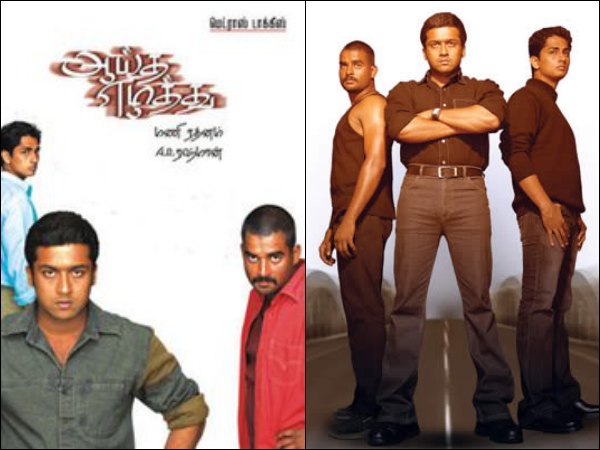

He was just too old for the role and in that sense is miscast. But here, one has to add that Devgn did what he could performance wise. Yet again, he shows us what a fine performer he is and gives a smoldering yet understated performance clearly outranking Ajay Devgn’s performance in Yuva. The big difference for me between the two films and therefore making this version the more watchable one is Suriya’s central act as the idealistic student leader and angry young man wanting to change the system. Esha Deol being the one common factor in both films is well… the same in both films, defeated a little by her sketchy role both times but yet, being the most likeable she has been on screen in Ratnam’s able hands.


Siddharth works better than Vivek Oberoi as the young man with dreams of going to America while Trisha perhaps is a just a notch lower to Kareena, not so much in performance, but Kareena had a stronger attitude and confidence in her interpretation of the role. There is little to choose between Rani Mukerji and Meera Jasmine, both being fine actresses. In fact, comparisons are inevitable between the two films.

Madhavan is not bad but has occassionally gone overboard at the excitement of being cast against type from his usual lover boy roles. Perhaps the only performance from Yuva that steals a march over Ayutha Ezuthu is Abhishek’s searing act as Lallan ahead of Madhavan’s Inba. In any case, strong performances have always been always Mani Ratnam’s strength. Still, there’s no doubt the film is well-crafted and in my opinion, the overall ensemble cast works better and gels together better in this version. And maybe I also find the Tamil version better as Mani Rathnam shot this after Yuva and was thereby able to cover up some of the original’s problems.Īs I said, my basic issues with the film remain much as I felt when I saw Yuva – the Amores Perros inspired structure – more a gimmick rather than naturally lending itself to the story, the naive and simplistic socio-political approach, finishing with the most interesting story first and one having to wait till mid-way of the second half for the story to move forward, and barring the Inba-Sasi story, the Mani Ratnam touch being inconsistent in the other two love stories. For all its problems, Yuva/Ayutha Ezhuthu is far, far better fare than most of the junk that was floating around in its time the name of cinema. Maybe it helps that I’ve seen this version much later and though one was disappointed by Yuva at the time (one always expects nothing short of something special from Mani Ratnam), one feels maybe one was a trifle harsh on the film in its time. But somewhere looking at both, I feel the Tamil version still has relatively more coherence and is actually the more engaging of the two versions.


 0 kommentar(er)
0 kommentar(er)
